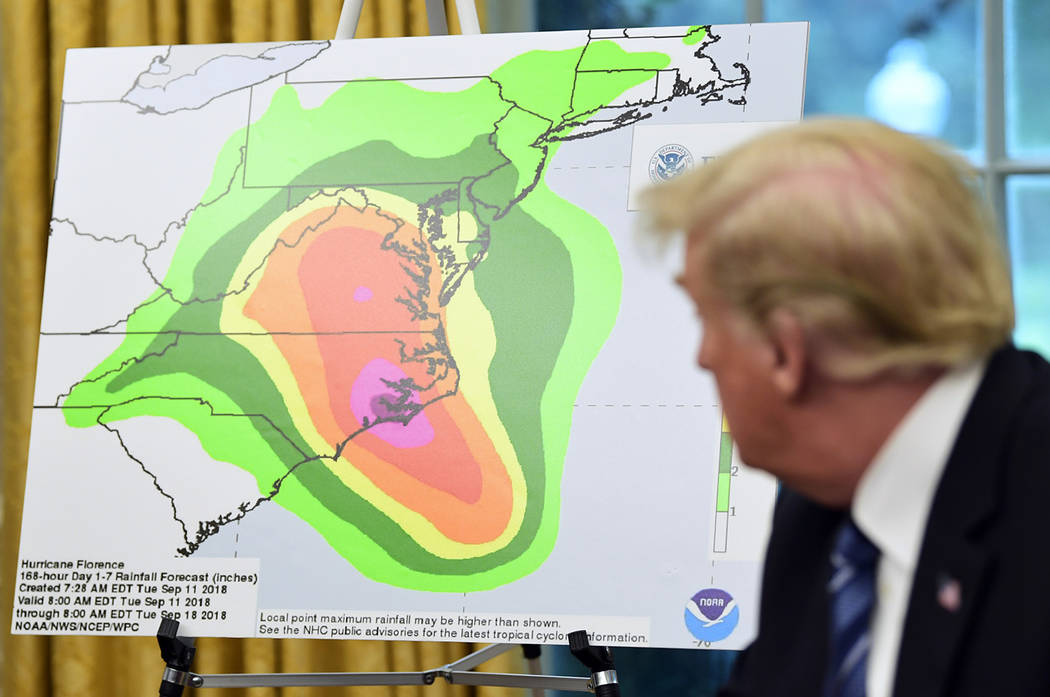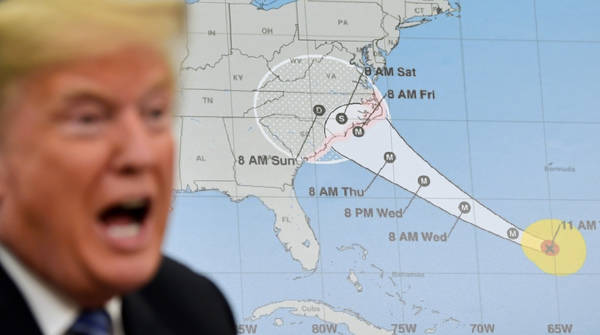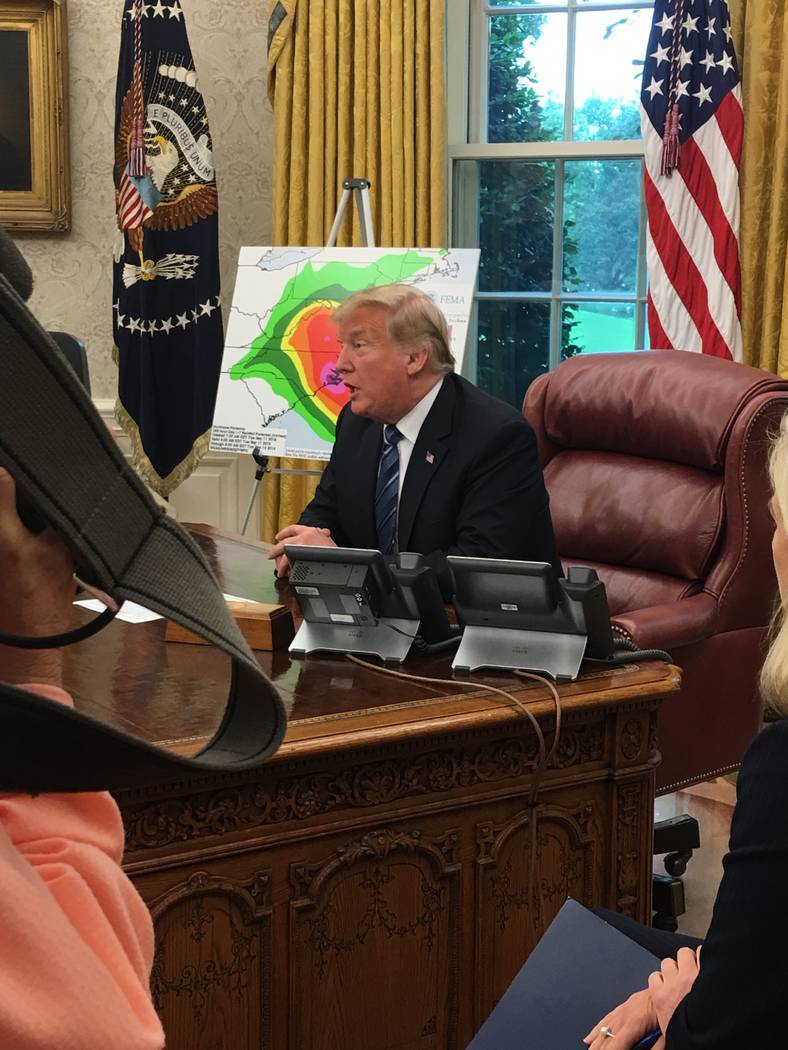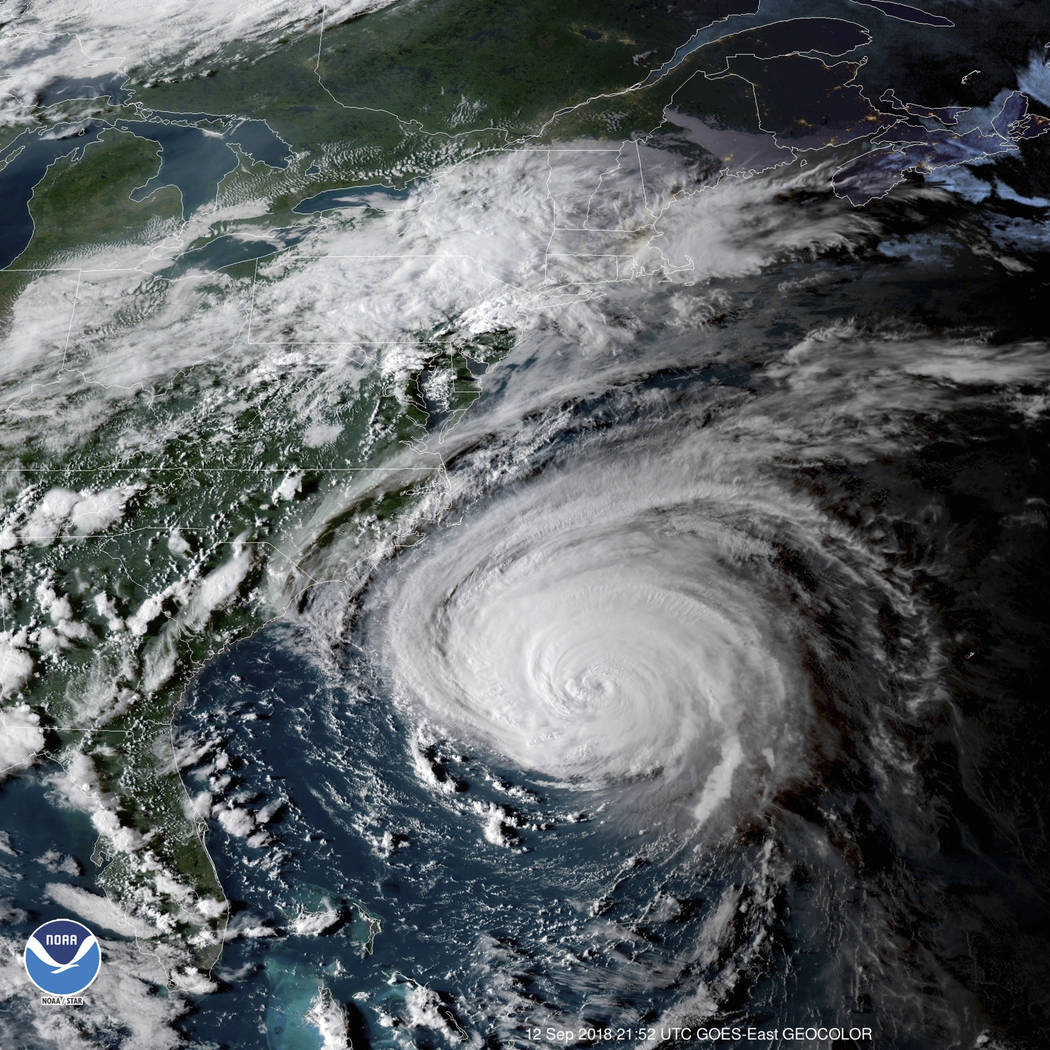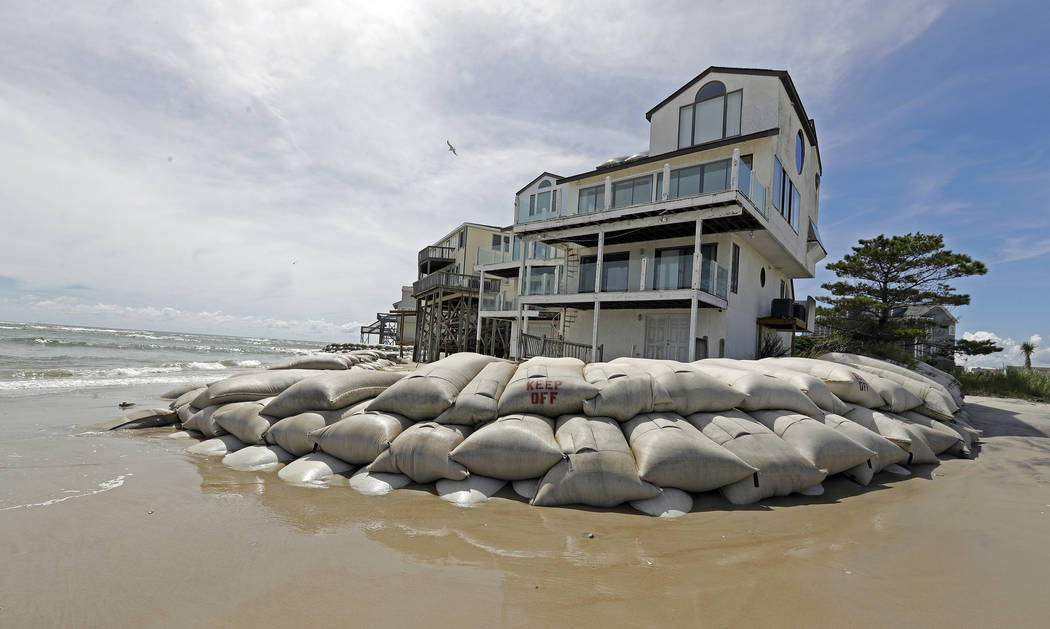Trump hopes to avoid political disaster with hurricane response
WASHINGTON — After a storm of criticism over his administration’s handling of last year’s Puerto Rico disaster relief, President Donald Trump is working hard to avoid political disaster by touting his administration’s preparedness as Hurricane Florence is poised to make landfall.
On Monday Trump signed emergency declarations for North Carolina and South Carolina. On Tuesday, he signed a similar measure for Virginia and met with Vice President Mike Pence, Homeland Security Secretary Kirstjen Nielsen and Federal Emergency Management Agency administrator Brock Long for a briefing ahead of the storm.
Trump interrupted the meeting to talk to reporters and urge those in evacuation areas to “listen to your local authorities” and “get out.”
With less than two months to go before the 2018 midterm elections, the moment had parallels with President George W. Bush’s handling of Hurricane Katrina in 2005.
Katrina, with its death toll of more than 1,800, was a notable factor in the GOP’s loss of control of the House and Senate in the 2006 midterm elections. Bush’s proclamation that his FEMA Director Michael Brown was doing a “heck of a job” haunted Bush from the moment he uttered it.
It was almost a year ago that Trump visited Puerto Rico, which had been battered by Hurricanes Maria and Irma. Trump playfully tossed paper towels at residents seeking supplies at a relief center – for which he was roundly criticized for appearing insensitive.
Last month, Puerto Rico’s governor raised the hurricanes’ death toll from 64 to 2,975, in keeping with a George Washington University assessment. Nonetheless, Trump told reporters his administration’s work in the island territory was “an incredible, unsung success.”
Trump’s claim challenged
Senate Minority Leader Chuck Schumer, D-N.Y., responded to Trump’s comments with a tweet: “This is an offensive, hurtful and blatantly false comment from the president. Nearly 3,000 of our fellow citizens died in Puerto Rico following Hurricane Maria. That is the complete opposite of ‘success.’”
This is an offensive, hurtful and blatantly false comment from the president.
Nearly 3,000 of our fellow citizens died in Puerto Rico following Hurricane Maria. That is the complete opposite of “success.” https://t.co/10ppsKwefb
— Chuck Schumer (@SenSchumer) September 11, 2018
Trump assured reporters that Puerto Rico Gov. Ricardo Rosselló would say that the Trump administration did “a great job.”
Later Rosselló released a statement in which he asserted, “No relationship between a colony and the federal government can ever be called ‘successful’ because Puerto Ricans lack certain alienable rights enjoyed by our fellow Americans in the states.”
Carmen Yulin Cruz, the mayor of San Juan, Puerto Rico, with whom Trump sparred repeatedly last year, tweeted, “If he thinks the death of 3,000 people is a success God help us all.”
Pres Trump thinks loosing 3,000 lives is a success. Can you imagine what he thinks failure looks like?
— Carmen Yulín Cruz (@CarmenYulinCruz) September 12, 2018
Trump argued that “Puerto Rico was incredibly successful” in light of the challenges the government faced trying to facilitate recovery in an island with a challenged infrastructure in a disaster-heavy year.
“I think that’s probably a little bit of an overstatement, but to be frank, not that far off,” said Steve Bucci of the right-leaning Heritage Foundation.
Bucci called the task facing FEMA and allied organizations in Puerto Rico “an enormous task under the worst conditions.”
According to the Government Accountability Office, four disasters in 2017 – three hurricanes (Harvey, Irma and Maria) as well as California’s wildfires — “created unprecedented demand for federal disaster help.”
“The sequential and overlapping timing of the three hurricanes” caused staffing shortages that affected recovery efforts in the territory, the GAO said in a report published Sept. 4.
$12 billion cost
While fact checkers have called out Trump for saying Puerto Rico’s electric grid was “dead before the storm even hit” — the system was broke but operational — the U.S. Corps of Army Engineers installed more than 1,700 emergency electric generators in Puerto Rico – a big bump from the 310 provided after Katrina, according to the GAO.
FEMA’s Puerto Rico work represented the “largest and longest single response in the agency’s history” – at a cost of $12 billion as of April, the GAO reported.
On Tuesday, as Hurricane Florence barreled toward the Carolinas, Sen. Jeff Merkley, D-Ore., claimed the administration had taken nearly $10 million from FEMA’s “response and recovery” budget and put it in the coffers of U.S. Immigration and Customs Enforcement.
The claim sparked an emphatic denial from the Department of Homeland Security, which said the impact on FEMA’s response and recovery efforts was zero. The agency’s budget is more than $15 billion.
At a news conference at FEMA’s Washington headquarters about the impending hurricane, officials said the agency was properly funded and prepared, and it was most important to focus on the upcoming storm, which could do catastrophic damage.
“We have plenty of resources both monetary, staff and commodities to respond to the dangerous storm that is Hurricane Florence,” said administrator Jeff Byard. “Right now we want to focus on those impacts from Florence and what can our citizens do today, which is the last good day to evacuate.”
Contact Debra J. Saunders at dsaunders@reviewjournal.com or 202-662-7391. Follow @DebraJSaunders on Twitter. The Associated Press contributed to this report.



